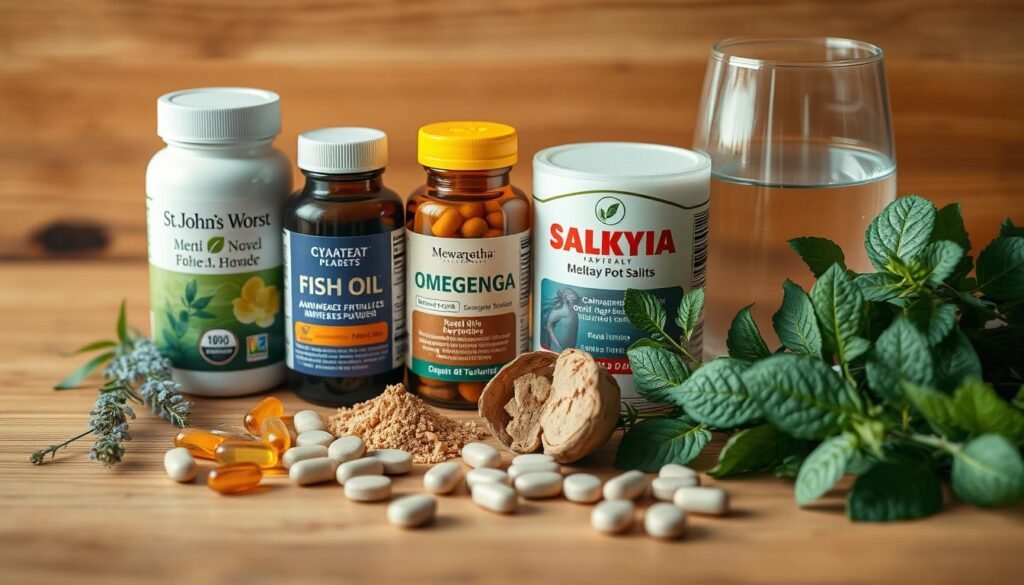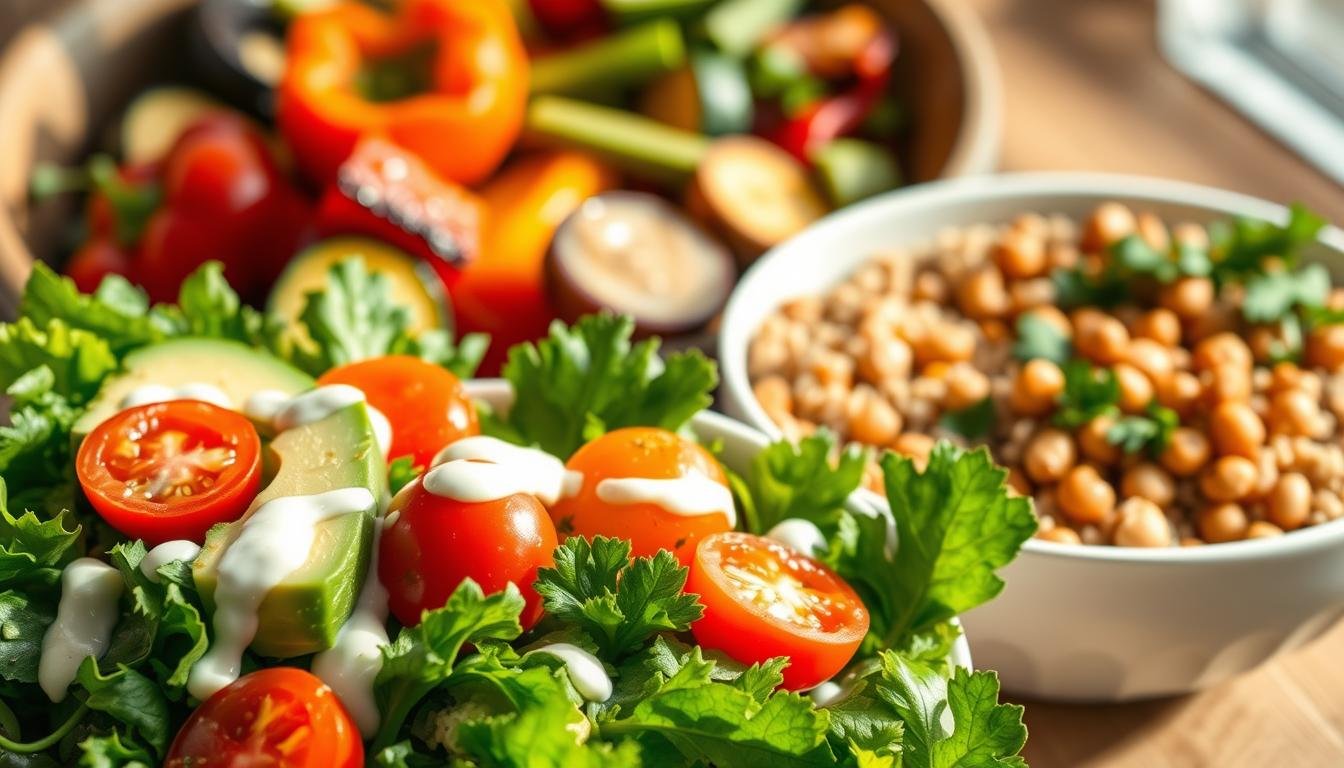Can what we eat really change how we feel? The link between food and mood is deeper than many realize. Studies show that some nutrients can greatly affect our mood and well-being.
Eating a balanced diet rich in essential nutrients helps our physical and emotional health. Foods known as brain food boost our brain function and mood. Knowing how nutrition affects our emotional health is key to a healthy mental health diet.
Key Takeaways
- The food we eat has a significant impact on our mood and emotional well-being.
- A balanced diet is crucial for supporting both physical and emotional health.
- Certain nutrients can enhance cognitive function and stabilize mood.
- Understanding the connection between nutrition and emotional state is vital.
- Eating the right foods can be a key component of a healthy lifestyle.
Understanding Mental Health and Nutrition
Nutrition is key to our mental well-being. What we eat affects our mood, thinking, and overall happiness.
The Connection Between Diet and Mental Health
Studies show a strong link between diet and mental health. Eating too much processed food and sugar can harm our mental state. On the other hand, eating whole foods, fruits, and veggies can help.
Nutrients are vital for our brain’s function and growth. Not getting enough of certain nutrients can cause mental health problems.
Key Nutrients That Impact Mood
Some nutrients greatly affect our mood. Omega-3 fatty acids are good for our brain and can help with depression. Vitamin D, B vitamins, and minerals like magnesium and zinc also play a big role.
- Omega-3 fatty acids: Supports brain health and may help reduce symptoms of depression.
- Vitamin D: Important for mood regulation and overall mental health.
- B Vitamins: Play a crucial role in synthesizing neurotransmitters that regulate mood.
The Role of Gut Health in Mental Well-Being
The gut and brain are connected through the gut-brain axis. This network lets them talk to each other. A healthy gut is vital for our mental health, as it helps make neurotransmitters and hormones that control our mood.
To keep our gut healthy, we should eat fermented foods, prebiotics, and probiotics. This supports our gut microbiome.
Brain Food: What to Include in Your Diet
The food we eat is key to our mental health. It affects our mood and how well we think. Eating the right foods can help our brains stay healthy and improve our mood.
Omega-3 Fatty Acids and Their Benefits
Omega-3 fatty acids are vital for our brains. They help us think clearly and might ease depression. You can find omega-3s in:
- Fatty fish like salmon and sardines
- Nuts and seeds, such as walnuts and chia seeds
- Fortified foods, including certain eggs and yogurts
Eating these foods can boost your mental health. Omega-3s help our brain cells work better. This might lower the chance of mental health problems.
Antioxidants and Brain Health
Antioxidants protect our brains from damage. Eating foods full of antioxidants can keep our brains healthy. This might slow down brain aging.
Foods packed with antioxidants are:
- Berries, such as blueberries and strawberries
- Leafy greens like spinach and kale
- Other fruits and vegetables, including tomatoes and bell peppers
Whole Grains: A Steady Source of Energy
Whole grains give our brains a steady flow of energy. They’re full of fiber, vitamins, and minerals. These nutrients support our overall health.
Eating whole grains helps keep our energy up and supports our mental health. Good examples are brown rice, quinoa, and whole-wheat bread.
Adding these foods to your diet can help you take care of your mental health. It can also improve your overall well-being.
Foods to Avoid for Better Mental Health
Nutrition is key to mental health. Some foods can make symptoms of anxiety and depression worse. It’s important to know which foods to limit or avoid.
Limiting certain foods is a big step towards better mental health. We’ll look at important foods to watch out for.
Sugar and Its Impact on Energy Levels
Too much sugar can mess with your energy. It can make you feel tired and irritable. This is because your blood sugar levels go up and then down.
To avoid this, cut down on foods with added sugars. Baked goods, sugary drinks, and candy are high in sugar. Instead, choose fruits for a natural sweetness that doesn’t crash.
Processed Foods and Mood Swings
Processed foods have unhealthy ingredients like preservatives and artificial flavorings. These can cause inflammation, which is linked to depression and anxiety.
Eating less processed food can help your mood. Focus on whole foods like vegetables, fruits, and lean proteins for better mental health.
Caffeine: A Double-Edged Sword
Caffeine can be good or bad for your mind, depending on how much you drink. A little can help you stay alert, but too much can make you jittery and anxious.
Watch how much caffeine you drink, especially in the afternoon and evening. It can mess with your sleep. Try to limit or avoid caffeinated drinks like coffee and energy drinks.
| Food Category | Potential Negative Impact | Healthier Alternatives |
|---|---|---|
| Sugary Foods | Energy crashes, irritability | Fruits, nuts |
| Processed Foods | Inflammation, mood swings | Whole grains, lean proteins |
| Caffeine | Jitteriness, anxiety, insomnia | Herbal teas, water |
Mood-Boosting Nutrition: What to Eat
Eating the right foods can really help your mood and mental health. A diet full of important nutrients is key for feeling good emotionally and mentally.
The Importance of B Vitamins
B vitamins are vital for our brain’s health and growth. They help make neurotransmitters like serotonin and dopamine, which control our mood.
Key B vitamins are B6, B9 (folate), and B12. Foods like leafy greens, legumes, and lean meats are full of these vitamins. They can help with depression and anxiety.
Protein-Rich Foods and Serotonin Production
Protein is needed to make neurotransmitters, like serotonin. Serotonin helps with mood, hunger, and sleep.
Eating protein-rich foods like chicken, fish, eggs, and dairy can boost serotonin. This might make you feel better and help with depression.
Fermented Foods for Gut Health
Fermented foods are packed with probiotics, which are good for your gut. A healthy gut is linked to better mental health and less anxiety and depression.
Examples of fermented foods are yogurt, sauerkraut, kimchi, and kefir. Adding these to your diet can help keep your gut healthy. This supports your mental well-being.
The Science Behind Food and Feelings
There’s a real link between what we eat and how we feel. This connection is backed by science. We’re learning how our diet affects our mental health.
The Brain-Gut Connection Explained
The brain and gut talk to each other in a special way. This connection helps us understand how food affects our mood and mental health.
The Gut Microbiome’s Role: Our gut microbiome makes chemicals that can change our mood. Keeping our gut healthy is key to feeling good.
Neurotransmitters and What They Need
Neurotransmitters are like messengers in our brain. They help control our mood, hunger, and sleep. Certain foods are important for making these messengers work right.
- Serotonin: Made from tryptophan, found in protein foods.
- Dopamine: Affected by tyrosine, an amino acid, and certain foods.
How a Healthy Diet Transforms Your Mind
Eating well can really change how we feel. Eating whole foods supports our brain health. It might even help with mental health issues.
| Nutrient | Food Sources | Benefit to Mental Health |
|---|---|---|
| Omega-3 Fatty Acids | Salmon, Walnuts, Chia Seeds | Supports brain health, reduces symptoms of depression |
| B Vitamins | Whole Grains, Leafy Greens, Nuts | Essential for neurotransmitter synthesis, energy production |
| Antioxidants | Berries, Leafy Greens, Other Fruits and Vegetables | Protects against oxidative stress, supports overall brain health |
Learning about food and feelings helps us make better diet choices. This can lead to better mental health and happiness.
Meal Planning for Mental Well-Being
Meal planning is key for your mental health. A good meal plan gives your brain the nutrients it needs. This helps your mental well-being.
Good meal planning means knowing the right mix of carbs, proteins, and fats. It also means picking foods that make you feel good and snacks that help your brain.
Balancing Macronutrients for Mental Health
A balanced diet is vital for your mental health. Carbohydrates give your brain energy. Proteins help make neurotransmitters. And fats, especially omega-3s, are important for brain function.
Here’s a guide to balancing your macronutrients:
| Macronutrient | Recommended Daily Intake | Examples of Foods |
|---|---|---|
| Carbohydrates | 45-65% of total calories | Whole grains, fruits, vegetables |
| Proteins | 15-20% of total calories | Lean meats, fish, eggs, legumes |
| Fats | 20-35% of total calories | Nuts, seeds, avocados, olive oil |
Sample Meal Ideas for Mood Boosting
Adding brain food to your diet can be tasty and easy. Here are some meals that can lift your mood:
- Oatmeal with Banana and Nuts: A mix of complex carbs, potassium from banana, and healthy fats from nuts.
- Grilled Salmon with Quinoa and Vegetables: Salmon for omega-3s, quinoa for complex carbs, and fiber from veggies.
- Avocado Toast on Whole Grain Bread with Poached Eggs: Avocado for healthy fats, whole grain bread for carbs, and eggs for protein.

Snacks That Support Brain Function
Healthy snacking is crucial for your mental health. Pick snacks that are full of nutrients and good for your brain. Some options include:
- Nuts and seeds, especially walnuts and chia seeds, for omega-3s.
- Fruits, especially berries, for antioxidants.
- Dark chocolate for flavonoids that help your brain.
Lifestyle Changes to Enhance Mental Health
Many lifestyle factors help improve mental health, besides what we eat. Diet is key, but other things also affect our mood and well-being.
The Role of Exercise in Nutrition
Exercise is vital for a healthy lifestyle, adding to the benefits of good nutrition. It helps lower anxiety and depression, boosts mood, and sharpens the mind. Exercise affects mental health by releasing endorphins, which are natural mood boosters.
Try to do at least 30 minutes of moderate exercise each day. Walking, cycling, or swimming are great choices. Adding strength training and flexibility exercises also helps with mental health.
Mindful Eating: A Key to Happiness
Mindful eating means focusing fully on eating and drinking. It’s about noticing the food’s colors, smells, and tastes. Mindful eating can reduce stress and make eating more enjoyable, improving our relationship with food.
Start by eating slowly and savoring each bite. Avoid distractions like TV or phones during meals. This can lead to better digestion and a deeper appreciation for food, making meals more enjoyable.
Staying Hydrated for a Clear Mind
Drinking enough water is key for a sharp mind and clear thoughts. Even a little dehydration can cause tiredness, headaches, and trouble focusing. Drink plenty of water all day to stay sharp and focused.
Drink at least eight glasses of water a day. But, your needs might change based on how active you are, the weather, and more. Eating hydrating foods like fruits and veggies also helps meet your hydration needs.
| Lifestyle Factor | Impact on Mental Health | Tips for Implementation |
|---|---|---|
| Exercise | Reduces symptoms of anxiety and depression | Aim for 30 minutes of moderate-intensity exercise daily |
| Mindful Eating | Reduces stress and improves eating experience | Eat slowly, avoid distractions during meals |
| Hydration | Maintains cognitive function and mental clarity | Drink at least eight glasses of water per day |
Dietary Supplements for Mental Health
Dietary supplements can help improve mental health. A balanced diet is key, but supplements offer extra support. They are especially helpful when we don’t get enough nutrients or have specific mental health needs.
When to Consider Supplements
Knowing when to use supplements is important. People with strict diets, certain health issues, or taking meds that block nutrient absorption might need them. Always talk to a healthcare professional before starting any supplements.
Popular Options: Omega-3s, Probiotics, and More
Some supplements are known for their mental health benefits. Omega-3 fatty acids are good for brain health. Probiotics help keep the gut healthy, which is linked to better mental health. B vitamins and magnesium also support brain function.

Safety and Efficacy of Supplements
The safety and effectiveness of supplements vary. It’s important to pick high-quality ones from trusted brands. Since supplements are not regulated like medicines, knowing about possible side effects and interactions is key. Always check with a healthcare provider before using them.
To improve mental health through diet, focus on a balanced diet and supplements. This holistic approach can help support mental health.
Real-Life Success Stories: Diet and Mood
Many people have found a strong link between what they eat and how they feel. By choosing the right foods, they’ve seen big improvements in their mental health.
Personal Transformation Through Nutrition
Changing one’s diet can lead to a life makeover. A study in the Journal of Clinical Psychology showed that adding omega-3 fatty acids and antioxidants to the diet can help with depression.
Sarah, for example, had anxiety for years. But after eating more whole grains, fruits, and veggies, her anxiety went down a lot. “It was a game-changer,” she said. “I feel calmer and more in control.”
Community Initiatives That Promote Brain Food
Communities are also stepping up to support brain health through food. They’re starting local projects to promote eating foods that are good for the brain.
- Community gardens that grow fruits and vegetables.
- Nutrition workshops that educate people on healthy eating.
- School programs that incorporate healthy meal options.
These efforts not only help people eat better but also build a sense of community and support.
Expert Insights on the Effect of Diet
Nutrition and psychology experts agree: what we eat affects our brain and mood. Dr. Jane Smith, a leading researcher, says, “The food we eat directly impacts our brain function and mood.”
| Nutrient | Food Sources | Impact on Mood |
|---|---|---|
| Omega-3 Fatty Acids | Salmon, Walnuts, Chia Seeds | Improves cognitive function and reduces depression. |
| Antioxidants | Berries, Leafy Greens, Nuts | Protects against oxidative stress and improves overall brain health. |
| B Vitamins | Whole Grains, Eggs, Lean Meats | Plays a crucial role in synthesizing neurotransmitters that regulate mood. |
In conclusion, the link between diet and mental health is clear. Personal stories and expert advice show that making smart food choices can greatly improve mental well-being. By supporting community efforts, we can all work towards better mental health.
Getting Started with a Mental Health Diet
Starting a mental wellness diet can change your life. It’s a way to care for your mind by eating foods that boost your brain. Adding brain-boosting foods to your meals can help you feel better mentally.
Simple Steps to Revamp Your Diet
Begin with small changes in your eating. Add more whole grains, fruits, and veggies to your meals. Then, slowly add protein and healthy fats to help your brain and mood.
Setting Realistic Goals for Change
It’s important to set goals you can reach. Plan your meals for the week and adjust as needed. This keeps you on track and helps you make lasting changes.
Resources and Recipes for Healthy Eating
Look for online resources and cookbooks with healthy recipes. Eating for mental health can be tasty and fulfilling. By choosing wisely, you can create a diet that supports your mental health.



